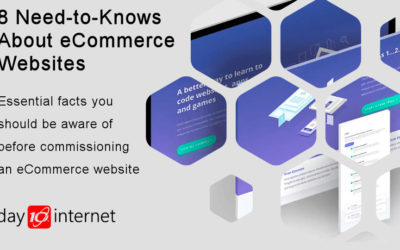 This is an update of an article I originally wrote in 2009. Since then, whilst many of the core components affecting search engine positioning have remained the same, search engines, and particularly Google, have become much more sophisticated in ranking websites.
This is an update of an article I originally wrote in 2009. Since then, whilst many of the core components affecting search engine positioning have remained the same, search engines, and particularly Google, have become much more sophisticated in ranking websites.
In this article I am going to look at some of the key factors involve in getting your website ranked on search engines such as Google. In fact, the examples and information I give below specifically relate to Google, however, since most search engines work in a similar way, the information is largely applicable across the board. So here goes.
Keywords
Your customers find your website by typing keywords (e.g. plumbers) or keyword phrases (e.g. plumbers in Hereford) into Google. If your site has been optimized for those keywords then the likelihood is that the site will be found. If it’s been optimized for some other keywords then it’s unlikely to be found.
So the choice of keywords is vital as the first step in Search Engine Optimization, or SEO. You need to be able to put yourself in the shoes of potential customers searching for the site and second guess the keywords that they are likely to use. This is not as easy as it sounds. Don’t just use the first words that come into your head. Try to get into the heads of your customers. They are likely to use totally different search terms from the ones you, as the business owner, would use.
Remember also, that your site is competing for position with other sites so the more specific the keywords, the less competition you will have. For example, there are a lot more sites that can be found with the keyword plumbers than the more specific phrase plumbers in hereford.
Choosing the right keywords is a crucial step in SOE and if you don’t do it properly you might as well not bother doing anything else.
Title Tags
Embedded in the underlying code that drives your web browser to display a web page, are Title Tags and Meta Tags. These are set when the web page is developed and they can be read by search engines but don’t appear on the actual web page that gets displayed. (This statement is not completely true because the page title, as defined by the title tag, appears at the very top left hand corner of Microsoft’s Internet Explorer browser).
The title should be meaningful rather than just being a string of keywords because it also appears as the title in the search engine listings when the page is found.
The title of each page is one of the most important factors in SEO. Putting appropriate keywords in the title tag of a web page can make a big difference to the ranking of that page.
Meta Tags
There are various types of Meta Tags.
- The Meta Description tag should contain a brief description of the page content and is important.
- The ALT tag for images is also important – see under Images below
- The Meta Keywords tag normally contains a simple list of keywords relevant to the content of the page. These days the Meta Keywords tag has very little influence on search engine rankings and Google is known to ignore it completely.
The Meta Description tag is important for two reasons. Firstly, search engines look for keywords in it and the appearance and position of keywords will have some impact on rankings, albeit not as much as those in the title tag.
The second reason though is that it is the description that usually gets listed, underneath the Title Tag when the page is found on Google. Therefore the description should be worded as if it’s an advert for the page to encourage people to click through to the site when they’ve found it from a search.
The Meta Description Tag is important for search engine ranking and to entice people to click to your site when they have found it through a search.
Site Structure
Search engines typically find out about your site using programs called robots or spiders which follow links from site to site or page to page. In order for them to find out about all your pages it’s important that your site has a good navigation structure with links that can be read by the robots as well as humans. In general this means
- Use text links for the main navigation rather than links based on images or Javascript.
- If this is not possible or desirable then provide alternative text links, for example in a text based menu positioned at the foot of each page.
- It is also a good idea to provide links to pages on your site from within the main page content where appropriate.
- Don’t use too many levels for the menu structure. Keep it to 3 at the most.
As far as possible keep the navigation straightforward to help search engine spiders index your site.
Page Content
Another important factor is the appearance of keywords in the page content. Search engines are looking at how relevant the keywords are to that page. Keywords that appear a number of times will be taken as relevant. Keywords that appear in section headings or are bolded will be taken as especially relevant and will help improve page rankings.
Having said this, however, it’s important that the content is not rendered unnatural by artificially stuffing it with keywords. That will simply cause the search engines to reject the page completely, regarding it as spam.
The important thing is to provide good, high quality content. This is becoming more and more important as search engines get more sophisticated.
It’s also important to keep updating the content. A site that is updated frequently will get looked at by search engines more often than a site that doesn’t change. This will improve its rankings – see this blog post for further explanation.
Good quality, relevant to your business content is important for getting good search engine rankings.
Images
An often overlooked factor in SEO are the images. You can get a small but surprising number if visits from people doing image searches on Google so make sure the images on your site, including those on your blog, are good quality and, where possible, have relevant ALT tags set.
Don’t ignore images on your site. They can often bring in a surprising amount of traffic to your site.
Blogs
One way of updating content without having to continually change the main body of the site is to include a blog. Blogs help search engine positioning because, firstly, they get updated more frequently and, secondly over time your site will acquire more and more content and more pages for the search engines to list and be found by users.
Including a blog on your site can help your search engine rankings.
External Links
The so called “on-page” factors described in the preceding sections indicate to search engines how relevant the site is to keywords that are being used for a search. The number of other sites linking to that site is used by search engines has traditionally taken by search engines as an indication of how popular, or how important, the site is.
So, getting other sites to link to yours is crucial for getting good rankings. But how do you do this? Many webmaster try to do this by asking other sites for link exchanges. I wouldn’t recommend doing this unless you’re trying to get as link from a site that has particular relevance to yours. Links from sites that have no relevance to yours will have little value in helping your search engine rankings and, in the worst case, your site may be penalized and lose ranking. Specifically don’t use so called link farms – sites that do nothing but provide links to other sites and avoid paying for links from such site.
The other thing to bear in mind with link exchanges it that, at the same time that inward links will provide a boost for you site, linking out from your site to other sites will decrease your site’s ranking to a certain extent. So you need to be very careful to ensure that you get a net gain from such exchanges.
Make your site so good, with excellent content, that other sites will want to provide links to it simply because it is so good.
Social Networking – Google+
The use of social networks to promote your site is a topic for another article, however, Goole+ does deserve a mention here. Google uses a website’s popularity as a factor in search engine ranking. Traditionally it has done this by looking at the number of external links to it – other sites linking to yours. However this is a pretty crude way of measuring popularity.
Now Google is starting to use the number of +1’s (Google’s version of “liking” something on Facebook) to judge popularity. Over time Google+ is expected to play a bigger and bigger role in search engine ranking.
To date Google+ has been seen as an “also ran” to Facebook and the jury is still out on whether it will survive. But that is no reason to ignore it and what is certain is that Google will increasingly integrate some form of social networking with it’s search engine ranking algorithms.
Don’t ignore social networking especially Google+
Popular Myths and Misconceptions
In the course of my work I frequently hear misconceptions about search engines from customers. Here are a few.
Continually resubmitting your site to Google improves its rankings.
Wrong. Once Google, or any search engine, knows about your site it will keep looking at it and re-indexing it. Resubmitting it, say monthly, can have a detrimental effect because this could appear as if you’re spamming the search engine. Your site could get penalized.
If you’re asked to pay for a service that will resubmit your site every month then you’d be wasting your money if you subscribed to it. As indeed you would if you subscribed to the following myth.
Submitting your site to 1000 search engines.
There aren’t 1000 search engines. In reality, nearly all traffic comes from about 6 search engines. Using an automatic process to submit your site to obscure search engines, many of which are just link farms that can get your site penalized, is a complete waste of time and money.
Sites that use sponsored links (Google Adwords) will get higher rankings in the natural listings.
This is simply not true. Google treats all sites the same as far as indexing for the natural listing is concerned.
Using a domain name with keywords in it will get you better rankings.
This one is debateable and the jury is still out on it. Personally I think it is proven that keywords in the domain name can make a difference in some cases. However, I think the effect is small.
Whether or not you should do it, I believe, is down to how you want your business to look. Taking my business as an example, I think that www.day10.com looks a lot more professional than say www.website-development-worcester.com. I believe a keyword based domain name is more relevant for a website aimed at promoting a single product or service as opposed to a business.
The future
Search engines are getting much, much more sophisticated at analyzing a website and recognizing its importance. Long gone are the days when you could simply add keywords into the meta tags and content and then hope for good rankings. Search engines are now moving towards being able to recognize the quality of a site in terms of the depth of its content and the degree to which the site is trusted by similar sites in its field.
To use an analogy, when you walk into a room at a conference or networking meeting you can usually spot the experts, or authorities in their field because they have something relevant to say and everyone, particularly other experts, wants to talk to them.
It’s exactly the same with a website. Search engines will be able to recognize the important sites by what they have to say, the content, and who’s listening, the sites that are linking to them and the amount of social networking “noise” that is being made about them.
So, faced with this, how will you be able to get good rankings?
Don’t put all your efforts into keywords. Keywords will still be important but more important will be content. Search engines will be able to recognize brochure sites and down rank them at the expense of sites that have something relevant to say. Use your site to provide your customers with information, not just advertising bumph about your company. Use the site to hold a dialog with your customers using blogs or forums for example.
In the future the sites that rank well will be sites that have been well written, with good quality, naturally written content as opposed to sites that have been subjected to endless rounds of search engine optimization for specific keywords.
And finally…
No matter what you do to your site to improve its rankings on search engines, if the site is badly designed and the content poor you’re wasting your time and money trying to optimize it. There’s no point in getting visitors to the site if they take one look at it and then click the back button.
And also remember, once a visitor arrives on your site, the site needs to be good enough to keep the visitor on it and induce him or her to take action (convert the visitor) – contact you or buy from you. If your site’s conversation score is zero, it will still be zero if you increase the number of visitors with SEO.





